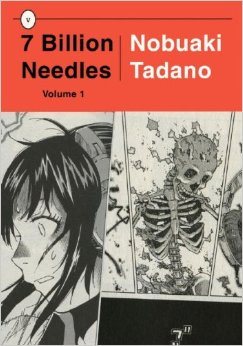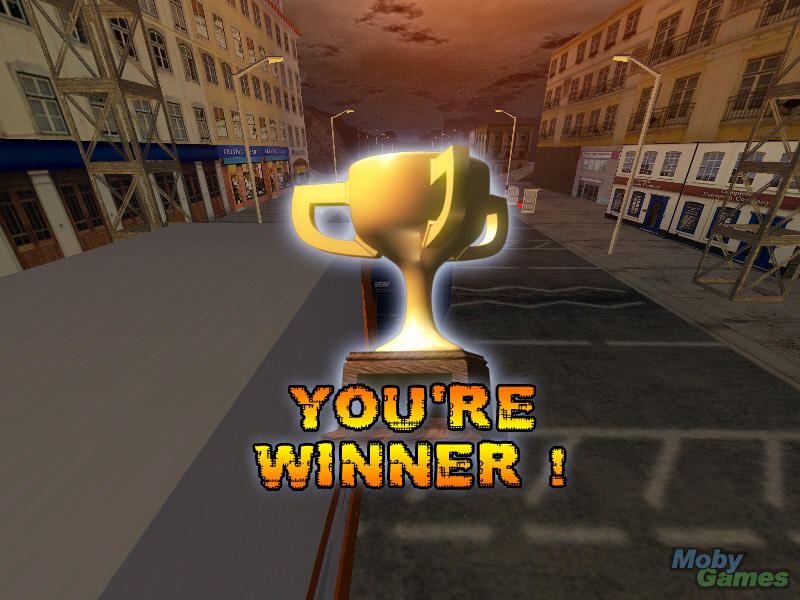 Do you like to read manga? How do you keep yourself distracted from the constant gasping, wheezing sound of the art form DYING ON ITS FEET?
Do you like to read manga? How do you keep yourself distracted from the constant gasping, wheezing sound of the art form DYING ON ITS FEET?
This is shit, guys. I got 7 Billion Needles in 2012. Junji Ito was in one of his periodic 2-3 year “releasing fucking nothing” dry spells, and this looked vaguely similar. What I got managed to be not what I expected via the contradictory path of being EXACTLY what I expected: cliche after cliche after cliche, hammered down with the repetition of a judge’s gavel.
This is the swill that passes for horror manga? Even a novice to the form like myself could pick up on all copy-of-a-copy ideas. “Main character fuses with a symbiote and fights monsters”? Off the top of my head: Parasyte, Variante, Tokko, and Genocyber…and I read LESS THAN ZERO manga. Main character’s an alienated high school girl? Be careful, I’m not sure Western markets are capable of handling this much originality.
The story is better recapped by someone who cares more than me (ie, anybody). The character design is workmanlike and boring. The art is full of computer-assisted gradient shading and all the other parlour tricks of a bored pen monkey cranking out a generic serial to an editor’s cracking whip. The plot has a lot of…events, you could call them. Things happen. Then they stop happening. Repeat for a few hundred pages. Launch franchise.
7 Billion Needles is apparently inspired by Needle, by Hal Clement. The storytelling is not reminiscent of any era of Western science fiction, just a very standard manga formula that’s executed neither better or worse than average, and doesn’t stand out even by being a train wreck. Cripples inspire pity: bores inspire no reaction at all.
When I think of horror manga, I think of Kazuo Umezu’s doomed worlds, Shintaro Kago’s gross-outs, Suehiro Maruo’s nihilism and aesthetics, Jun Hayami’s brutality, Junji Ito’s fetishistic HR Gigerisms…even Hideshi Hino’s primitive efforts have more panache and charm than 7 Billion Needles.
The title comes from a metaphor: the difficulty of finding a particular needle amongst seven billion other needles. This also describes the experience of anyone trying to find decent manga in this day and age.
No Comments »
 There’s a puddle of water on your floor. How did it get there? Maybe you have a hole in your roof. Unfortunately, you lack a ladder.
There’s a puddle of water on your floor. How did it get there? Maybe you have a hole in your roof. Unfortunately, you lack a ladder.
Is there a way to check if there’s a hole in your roof without a ladder? Affirmative. Does the puddle only appear when it rains? Does your house get cold at night? You can’t gain “ground knowledge” (or “roof knowledge”, or whatever) but clues can be used to triangulate what’s going on.
The key thing is that “my house gets cold” is a weaker form of evidence that actually seeing the hole in your roof, so it’s a good idea to let a few clues pile up before making judgement. JREF is wrong. Sometimes a plethora of weak evidence CAN equal strong evidence.
I like to do this with internet users. I can’t look into anyone’s head and determine that they’re stupid or pathological. But there are distinctive and uniform “tells” that relate to certain types of people. I’m against making snap judgement based on just one trait, but let each additional one be a hair raised on your neck.
Pink hair: likely a woman who posts frequently on twitter about how she “needs feminism”. Like many women who “need feminism”, a cauldron of insanity, vindictiveness, and narcissism. Comments will be interpreted as death and rape threats.
Anime girl avatar: strong risk factor for trolling, being a sockpuppet, or being from /r9k/.
Self-describes as an “atheist”, “rationalist”, “free-thinker”: moderate risk factor for selective skepticism, hivemindedness, or being some social cause’s automaton (substantially more so than someone who self-describes as “religious”)
Self-describes as “traditional”: very opposed to moral degeneracy. Deletes internet browser history with the frequency and compulsion of Lady Macbeth washing her hands.
Self-describes as a good person: thoughtful and conscientious. Keeps the thermostat low enough so that neighbours don’t have to smell the decomposing hooker in the basement.
South Park Avatar: guy who’s been on the forum for 10 years, and whose every post is an impenetrable mare’s nest of inside references and in-jokes. Every reply after him being some variant of “hur hur hur, that’s exactly what you’d say, South Park Avatar Guy. Hey, everyone, check it out. South Park Avatar Guy just said the kind of thing South Park Avatar Guy says.”
Avatar of himself playing guitar: male who disregards life in favour of carefully staged pictures of himself having a life. Zoom in and the guitar will probably be strung back to front and held in the wrong hand.
PGP Key in profile description: you’re not meant to USE it. You’re meant to ADMIRE it. Woah, shit, this busta has a PGP key!
I hope this has helped you in your online adventures. More will be posted at the brisk schedule of “probably never”.
No Comments »
 But not in the sense that I’m sitting here Youtubing Naruto AMVs. I like badness that’s intricate and elaborate. Badness that invites you to sit and think about it.
But not in the sense that I’m sitting here Youtubing Naruto AMVs. I like badness that’s intricate and elaborate. Badness that invites you to sit and think about it.
This is the itch that things like the Onion and Tim and Eric scratch so well. They take the small things that are subtly wrong about TV and exaggerate it into a yawning chasm of wrongness. This: to wit. Saccharine blandness overlaying a creepy cultlike message. Lovey-dovey cosmic oneness ideals mashed together with crude “get rich now” pragmatism. These ingredients combine and form a cake made of unease and discomfort, and it’s hard to look away.
But that video is satire. The truth is, there’s a lack of authentic badness in today’s world.
Blandness, boredom, hypocrisy, incompetence, and evil we have in abundance. Genuine cringeworthy badness, not so much. James Rolf (proprietor of The Angry Video Game Nerd, a Youtube series that critiques videogames) has lamented this in the past: there just isn’t enough material for him. Most videogames can be described as “mediocre and unmemorable.” There’s only so many games like Big Rigs: Over the Road Racing…an alleged racing game where your opponent never even moves, and when you cross the finish line you get a “YOU’RE WINNER” message. Most bad games are forgotten as soon as you put them away. Big Rigs tends to stay with you.
It’s not that something’s shoddily made. It’s that your brain was primed with certain expectations, and the thing either failed to meet them, or met them in an unsettling and disturbing way.
And it’s very hard to “fake”. We respond to authenticity, even when watching atrocity porn. That’s the reason Tara Gilesbie’s My Immortal became so notorious, while the countless attempts at one-upping it have failed…because it looked real, while the ripoffs. No comment on whether My Immortal itself was a troll job. That’s not the point, only that it was close enough to the genuine article to fool people.
One thing’s for sure: if you can generate authentic bad things on spec, you have a talent, and you should be using it to become rich. Trains are boring. We see them every day. Usually we don’t even look at them when they pass. But when they crash…now you’ve got attention.
No Comments »
 Do you like to read manga? How do you keep yourself distracted from the constant gasping, wheezing sound of the art form DYING ON ITS FEET?
Do you like to read manga? How do you keep yourself distracted from the constant gasping, wheezing sound of the art form DYING ON ITS FEET?

